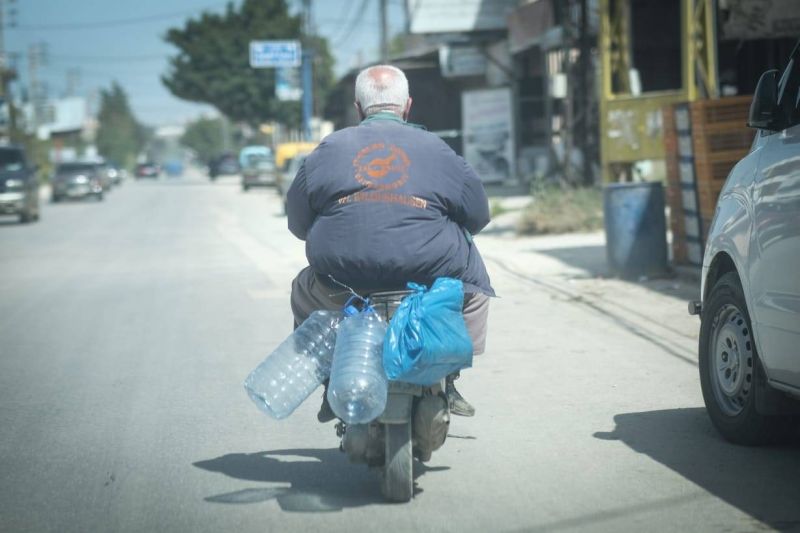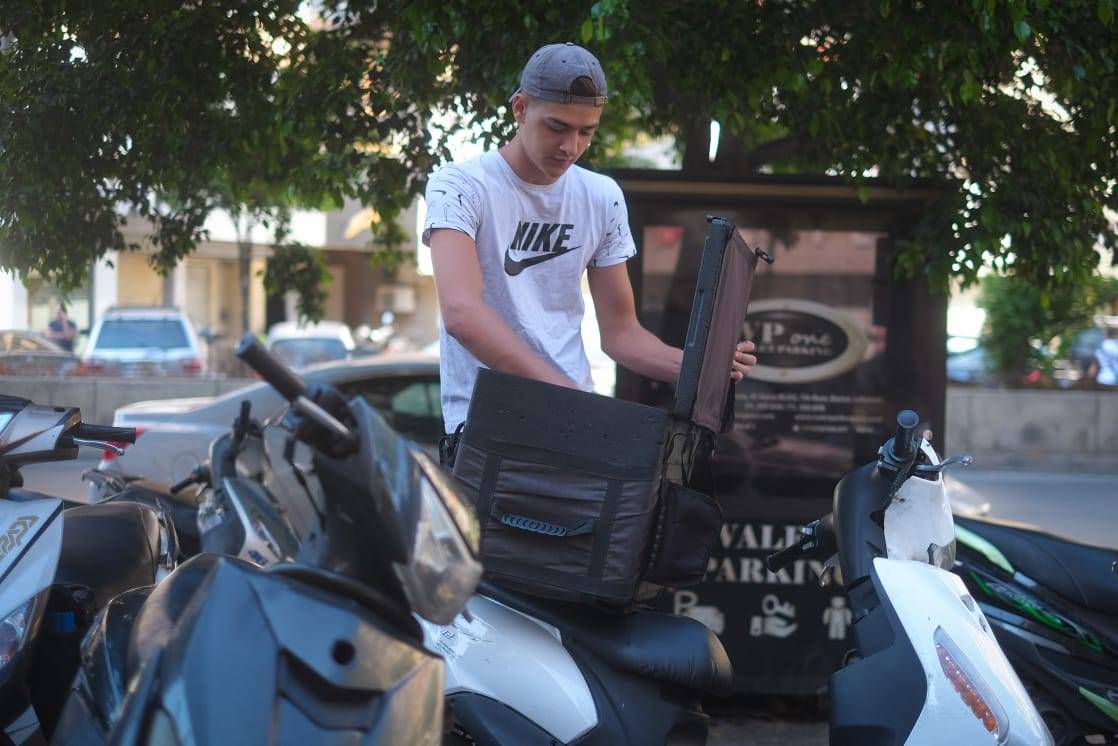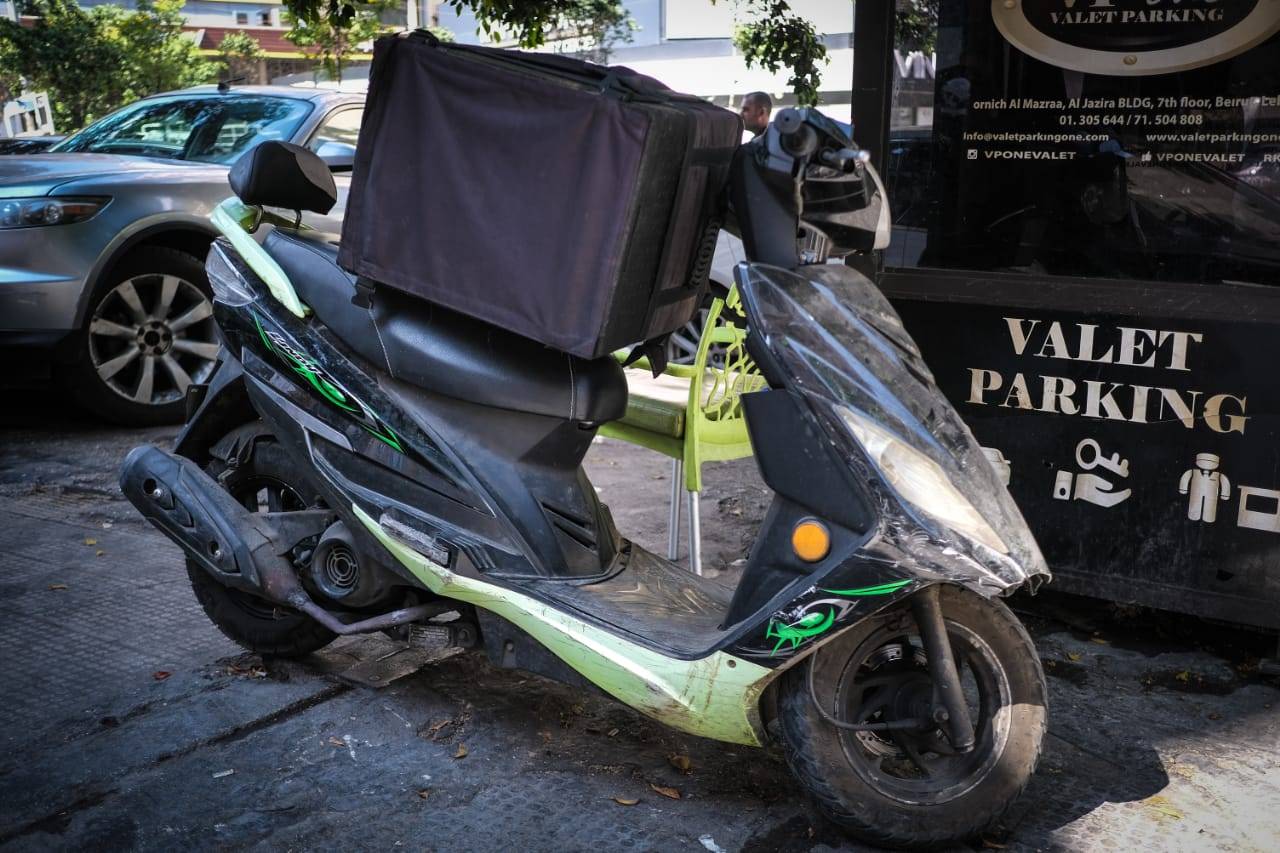
Man rides his motorcycle with empty bottles to refill with fuel in the Bekaa valley. (Credit: João Sousa/L'Orient Today)
BEIRUT — Every day, Fouad, a 22-year-old Syrian refugee, spends over 15 hours driving around on his motorcycle, delivering food all over Beirut.
Without his motorcycle, he’d be completely lost, as he would have no way to support himself and his parents back in Syria. Although he paid for the motorcycle himself, he doesn’t technically own it, and lives in fear every day that he’ll be stopped by a soldier in a bad mood, who might arrest him or, worse, impound his most prized possession.
Between fuel shortages plaguing the country amidst a spiraling economic crisis and meteoric rise in fuel prices, in addition to rising costs of car maintenance and public transportation, citizens and residents of Lebanon are increasingly looking for means of transportation that will not plunge them into even more debt.
Enter the motorcycle: not the cinematic Harley Davidson, which to many is as much as a pipe dream as a functioning government made up entirely of fresh faces, but the smaller scooters that have been known to dot the streets of Mediterranean cities for decades now.
Affordable and light, slurping less gasoline than cars, and with the added bonus of being able to zigzag through the often-unbearable traffic in Beirut and other cities, it’s always been a preferred way to get around for those working as delivery drivers — many of whom, in Lebanon, are Syrian refugees.
Prices at the pump push more to motorcycles
Rami, who owns a custom motorcycle shop in Beirut and is himself Syrian, says he has ‘absolutely’ noticed a trend in more people buying a motorcycle in addition to or in lieu of a car because of the soaring gas prices, among other reasons.
“There’s absolutely been an uptick in motorcycle and scooter ownership for the past five, six years,” Rami says. “Although the main reasons now are the economic and fuel crisis, people were seeking an alternative mode of transportation before the economic crisis as the city is very congested and you can barely find parking anywhere.”
But now that the two-wheeler has become a necessity for a growing number of people, men and — increasingly — women of varied social statuses, and of different nationalities, its ubiquity has also led to more crackdowns on unregistered motorcycles by the Internal Security Forces and sometimes the Lebanese Army.
A spokesperson with the ISF elaborated on the agency’s protocols in this context with L’Orient Today, acknowledged that there have been more ISF operations that focus checking the legality of motorcycles on the roads, although he took issue with the word “crackdown.”
“I can verify that more people are driving motorcycles now, due to fuel having become so expensive,” the spokesperson said, adding that this is also the case for tuk tuks, “although unregistered motorcycles were an issue we faced even before the crisis.”
However, he said, the reasons behind the lack of registration have changed since the onset of the crisis. Where previously many unregistered motorcycles belonged to Syrians, who, according to the spokesperson, need an iqama (residency permit) to officially register a motorcycle, a decision that he says was made by the government due to the many Syrians flocking to Lebanon during the war, the ISF now intercepts significantly more motorcycles owned by Lebanese.
“One of the main reasons we encounter a lack of registration is simply the inability to get the motorcycles registered because the registration office in question isn’t open due to a lack of personnel – many of whom are striking or refuse to come to work due to the diminished value of their salaries.” Others, he says, couldn’t afford the registration fees even if the office was able to stay open.
While the army will every so often carry out operations targeting stolen motorcycles, “If they find unregistered motorcycles and apprehend anyone in that context, they are then sent to the ISF, where they will be processed accordingly,” army spokesman Col. Fadi Abou Eid tells L’Orient Today. “The issue of unregistered motorcycles falls under the responsibility of the Ministry of Interior.”
Legal hurdles
While security forces see the seizure of unregistered motorcycles as simply the implementation of existing traffic laws, it ultimately tends to disproportionately hit the most vulnerable people in the country.
Those without legal residency, which is the case for most Syrians in Lebanon, are often denied the possibility to register a vehicle in their name, as article 149 of the traffic law specifies that you need a valid iqama (residency permit) to get a driver's license. But even for those with legal residency, there is in many cases a de facto practice of banning Syrians from owning motorcycles. As a group of researchers at the American University of Beirut wrote about the intricate legal maze Syrian delivery drivers have to maneuver in 2019, as part of the Beirut Urban Lab publication “Refugees as City-Makers,” “the legal framework (governing motorcycle ownership) is itself murky, uncertain, and rapidly changing, making it even harder to maintain a legal status,” and “checkpoints may begin to implement additional scrutiny or new measures that do not necessarily reflect a change in regulations, such as recent measures against motorbike drivers that convinced many of our interlocutors that a ban had been introduced on Syrians owning motorbikes when we found no legal basis for such a decision.”
 A delivery driver in Beirut loads up his order for delivery. (Credit: João Sousa/L'Orient Today)
A delivery driver in Beirut loads up his order for delivery. (Credit: João Sousa/L'Orient Today)
As such, most have had to find creative ways around their legal status. While many drive in Lebanon with an international driving license obtained in Syria, which police officers may or may not accept as a valid driving permit, the report noted, “others have resorted to registering the scooter in the name of a Lebanese acquaintance, relative, or friend and now drive it with a legal authorization from the latter.”
Rami said that he indeed knows many Syrians who have acquired a motorcycle with a Lebanese citizen acting as the middleman.
“What usually happens is that a Syrian will find a Lebanese friend who will register the motorcycle they bought in their name, so in case something happens they will be held responsible,” Rami says. “Once upon a time this used to be common practice — the municipality would even tacitly accept this procedure, maybe sometimes for a small price, you know how things go here.”
But authorities have made this process more difficult, and not everyone knows a Lebanese resident who is willing to vouch for them. So what do people do?
Some choose to buy an electric motorcycle instead of a gas-powered one, as they don't require registration. But electric motorcycles are more expensive and, most importantly, a risky investment in a country where electricity supply is unreliable.
So many Syrians “just take the risk” of buying a motorcycle, Rami says. “And if they impound your bike, you can't take it out until you have established a legal status, in the form of a driver’s license and registration, which is kind of impossible. So basically, your bike, or scooter, gets taken from you.”
Additionally, Rami says, owners of unregistered motorcycles have to be extra careful when it comes to traffic infractions, as the army and ISF are known to set up checkpoints with a flatbed truck.
“And as soon as they catch a motorcycle or a scooter that has any illegal situation, they would put it on the flatbed, and they take it to an impound, and good luck taking it out if you don't have legal status.”
Losing the motorcycle is not the worst that can happen in such cases.
“If you're a Syrian and they take you to the police station, they will try to find so many things on you, for instance, chances are your residency has expired or you are here in some kind of dodgy way, and they will use that as leverage,” he says.
The ISF spokesperson says that what happens to those caught with an unregistered motorcycle depends on how “complicated” the situation is: “For instance, the fee for driving without a license is around LL350,000 now (about $12 at the parallel market exchange rate) but if you also don’t have a valid license plate, of course the fee goes up significantly.”
As for whether enforcement operations disproportionately target Syrians or Palestinians, he says “in the end what happens to them when they get caught depends on their papers, as long as they are here legally, they will just have to pay the fine.”
“However,” he continues, “if they are without the appropriate papers, and they are here illegally, their situation is the same as before. If we catch them riding an unregistered motorcycle and find out in the process that they don’t have the required papers to legally stay in the country, we must take them to the police station, this would be normal anywhere, not just in Lebanon.”
'Manufactured vulnerability'
The 2019 AUB report asserts that “a Syrian driver’s visibility riding a scooter on the city’s streets can be described as ‘tolerated’ since he is performing an occupation within the acceptable ‘menial’ functions typically ascribed to his countrymen. Yet this presence is heavily negotiated, since it is looked at suspiciously by some and criminalized by others. As a result, there are always risks to be stopped, harassed, fined, taken to spend a night at the police station and/or to lose one’s motorbike without much hope to recover it.”
Mona Fawaz, one of the report’s authors, said she would wager that the situation for Syrian delivery drivers has become even more precarious since the research was done.
“The situation they are placed in is what Nizar Saghieh, of Legal Agenda, calls manufactured vulnerability, which is when there is a public policy in which you basically keep changing decisions and procedures in a way that people make a choice that then locks them into the impossibility of making another choice,” Fawaz told L’Orient Today.
Palestinian refugees face similar issues, to a lesser extent.
"While Palestinian refugees in Lebanon are prohibited from owning a red public license plate to drive a taxi or van ... [working] in public transport … requires [membership in the drivers’ syndicate], which Palestinian refugees are prohibited from joining, Palestinian refugees are able to own vehicles,” says Lynn Abukhadra, a researcher at Synaps, a research center in Beirut. However, she added, “The number [of Palestinian vehicle owners] isn’t high: less than 40 percent based on the 2015 the AUB UNRWA socioeconomic survey."
The ISF source also said that as far as he knows, Palestinians are allowed to register motorcycles. Despite that, “as a Palestinian, you always have to be cautious, wherever you go,” says Marwan, a Palestian refugee who says he not only depends on his motorcycle to make a living, doing odd jobs here and there, but to “maintain a sense of freedom.” Although he was born and raised in Beirut, like many Palestinians in Lebanon, he says he perpetually feels trapped and on edge, but riding his motorcycle around sunset gives him a sense of freedom and connection with the city.
“But even if [the motorcycle] is in my name, I always make sure to avoid certain checkpoints or gatherings whenever I can … when you’re Palestinian, the law means nothing,” Marwan says. “If I catch the wrong guy, he can just confiscate my bike – I worry about this all the time.”
There is one particular place in the country where both Lebanese and non-Lebanese have to be extra careful when riding a motorcycle: Saida.
“The checkpoint over there does not allow motorcycles or scooters to pass through. Not even if you’re Lebanese,” Rami says. “The reasoning behind this is that in the nineties, three judges were shot by guys on a scooter. So, you know, instead of banning guns, they decided to ban scooters.”
Fouad, the Syrian delivery driver, says that, while he has heard stories of Syrian refugees being caught with an unregistered motorcycle, who were then taken to jail for a night or two or had their bikes confiscated, it has never happened to him or anyone close to him. “But of course I believe these stories, we’re treated as second-class citizens in this country by regular Lebanese, so imagine how the ISF will treat us.”
Like Marwan, he avoids certain areas if he hears of checkpoints or increased army or ISF presence.
Rami says that after a specific period has passed, compounded bikes get sold at a public auction, “where they go for pennies, basically.”
As for impounded bikes, the ISF spokesperson says that once the traffic ticket is paid, the motorcycle will be returned to its rightful owner, “unless, of course, their motorcycle isn’t registered, in which case they are not the rightful owner.” He also added that when it comes to more complicated cases, they will be referred to a judge, who will decide what next steps will be taken. “That is out of our jurisdiction, all we do is make sure that the law is abided by.” Impounded bikes are, in some cases, sold at auction, he said, adding, “Again, this is standard procedure, not just in Lebanon.”
 A delivery scooter parked on the streets of Beirut. (Credit: João Sousa/L'Orient Today)
A delivery scooter parked on the streets of Beirut. (Credit: João Sousa/L'Orient Today)
'Unsung heroes of transportation'
“If you lose your motorcycle and your family's survival depends on you working as a delivery driver, you're again placed in an even more impossible situation to secure livelihood without the basic elements that you need,” Fawaz said. “So once that happens, what can they do? We all know they can't do anything, they can't go back to Syria, they can't leave, they're stuck.”
Fawaz thinks it is particularly worth highlighting that the very people the Lebanese relied on during lockdown and the pandemic era in general, to deliver food, medication and other care for so long, even more than before, are the ones being made increasingly vulnerable.
“They became part and parcel of what you can call the critical care of the urgent infrastructure of the city that allowed us to actually sustain ourselves,” Fawaz says. “So, it is crazy that we don't come to the point where we question how we are actually dealing with this population.”
Rami agrees.
“Scooters are the unsung heroes of transportation,” he says. “And so they should be affordable and accessible to all of us.”